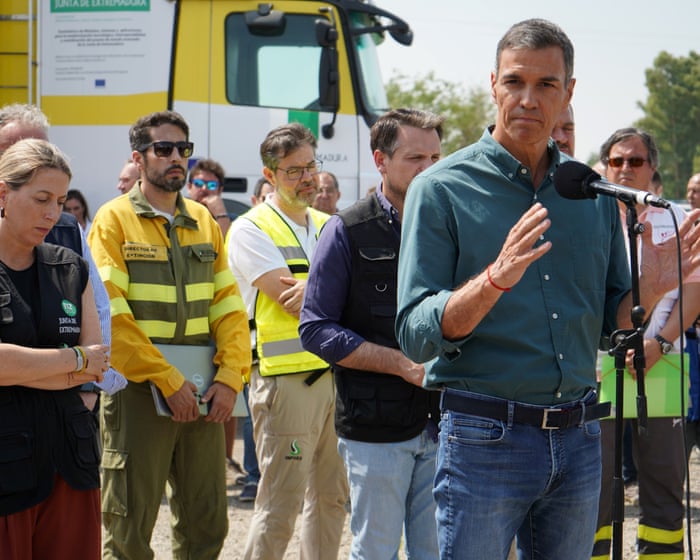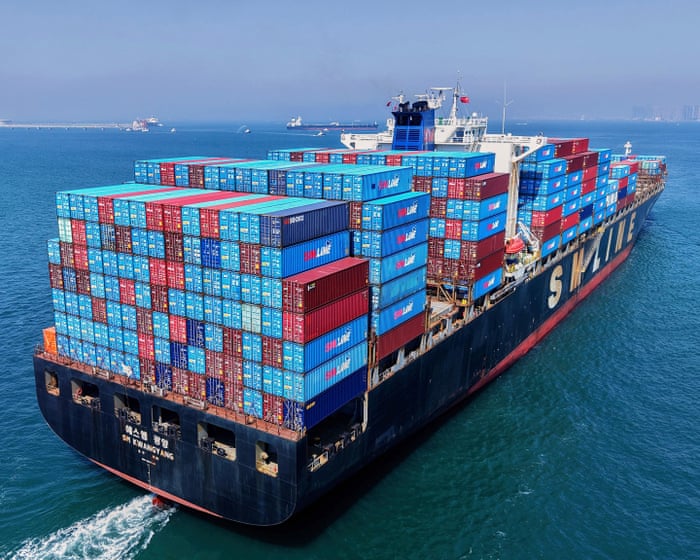Les incendies en Espagne ont brûlé 373 000 hectares de terres et coûté la vie à quatre personnes, soulignant le besoin urgent de réévaluer et de renforcer la préparation et les efforts d'intervention du pays. Le Premier ministre Pedro Sánchez a souligné que cela doit faire partie d'une stratégie à long terme et non partisane pour faire face aux impacts croissants de la crise climatique.
Lors d'une visite dans la région d'Estrémadure mardi, Sánchez a noté que bien que la vague de chaleur record de 16 jours qui a alimenté les incendies soit terminée, les pompiers combattent encore des incendies majeurs dans le nord-ouest de l'Espagne, et des moments difficiles restent à venir.
Il a cité ces incendies de forêt, ainsi que les graves inondations de l'année dernière à Valence, comme preuves évidentes que l'urgence climatique s'intensifie en Espagne chaque année. "Nous devons être mieux préparés avec les bons outils et mécanismes pour atténuer l'impact de ces catastrophes climatiques lorsqu'elles se produisent", a-t-il déclaré. "La crise climatique s'aggrave et devient plus fréquente, et ses effets s'accélèrent chaque année."
Sánchez a ajouté que les personnes touchées par les incendies lui ont dit qu'elles souhaitaient une approche cohérente et non idéologique de l'urgence climatique - une approche qui s'étende au-delà des cycles politiques à court terme. "Malgré les prévisions scientifiques, nous constatons que la situation se détériore plus rapidement chaque année, en particulier ici dans la péninsule ibérique", a-t-il déclaré. "Nous devons ajuster et améliorer à la fois nos capacités d'intervention et de prévention."
Le Premier ministre, qui a précédemment appelé à un "pacte d'État" pour lutter contre la crise climatique, a déclaré qu'il présenterait son plan début du mois prochain. "Si l'urgence climatique s'aggrave chaque année, nous avons besoin de politiques qui survivent aux gouvernements individuels et deviennent des engagements permanents de l'État, liant toutes les institutions et les futurs dirigeants", a-t-il expliqué.
La réponse aux incendies a été compliquée par des désaccords politiques. Le Parti populaire (PP) conservateur a accusé Sánchez d'utiliser le pacte proposé pour détourner l'attention de ce qu'il appelle sa mauvaise gestion de la crise. Un porte-parole du PP a déclaré lundi : "Les pactes d'État n'éteignent pas les incendies et ne réparent pas les dégâts. Les gens attendaient plus qu'un coup publicitaire pour sauver sa réputation après une semaine d'absence."
Le chef du PP, Alberto Núñez Feijóo, a affirmé que Sánchez avait ignoré les demandes d'envoi de plus de troupes dans les zones les plus touchées et sous-investi dans les mesures de prévention. "Le travail de Sánchez est d'apporter une aide, pas de chercher des raccourcis et d'improviser toujours", a déclaré Feijóo mardi.
Foire Aux Questions
Bien sûr. Voici une liste de FAQ utiles sur la préparation de l'Espagne à la crise climatique suite aux récents incendies meurtriers.
**Compréhension générale**
**Q : Que signifie réellement la préparation à la crise climatique ?**
**R :** Cela signifie préparer les systèmes d'un pays - comme les services d'urgence, les soins de santé, les infrastructures et les lois - à mieux prévoir, répondre et se remettre des événements météorologiques extrêmes aggravés par le changement climatique, tels que les incendies de forêt, les vagues de chaleur et les inondations.
**Q : Pourquoi le Premier ministre dit-il cela maintenant ?**
**R :** La déclaration a probablement été motivée par les récents incendies graves et meurtriers en Espagne. Ces événements servent de démonstration concrète et frappante de la menace urgente, montrant que les plans et les ressources actuels pourraient ne pas être suffisants face à la nouvelle ampleur de ces crises.
**Q : L'Espagne n'est-elle pas déjà habituée à lutter contre les incendies ?**
**R :** Oui, l'Espagne a une longue expérience dans la gestion des feux de forêt. Cependant, le changement climatique rend ces incendies plus intenses, imprévisibles et difficiles à contrôler. Ils brûlent de plus grandes surfaces, se propagent plus vite et se produisent en dehors de la saison estivale traditionnelle, submergeant les systèmes d'intervention existants.
**Le Problème & Le Besoin**
**Q : Quelles sont les principales faiblesses de la préparation actuelle de l'Espagne ?**
**R :** Les faiblesses clés incluent souvent des ressources limitées pour les avions et le personnel de lutte contre les incendies, des pratiques de gestion forestière obsolètes qui permettent à un sous-bois trop inflammable de s'accumuler, un développement urbain trop proche des zones forestières et des infrastructures qui peuvent déclencher des incendies.
**Q : Comment le changement climatique aggrave-t-il spécifiquement les incendies ?**
**R :** Il crée une tempête parfaite de conditions : des températures plus chaudes assèchent la végétation, la transformant en combustible ; des sécheresses plus longues et plus sévères augmentent cet effet ; et l'évolution des régimes de vent peut rendre la propagation des feux erratique et rapide.
**Q : Outre les incendies, à quelles autres crises climatiques l'Espagne doit-elle se préparer ?**
**R :** L'Espagne est également très vulnérable aux vagues de chaleur extrêmes, aux inondations soudaines dues à des pluies intenses, ainsi qu'à l'érosion côtière et aux inondations dues à l'élévation du niveau de la mer.
**Solutions & Actions**
**Q : Quelles sont les mesures spécifiques que l'Espagne peut prendre pour améliorer sa préparation ?**
**R :** Les actions incluent d'investir dans des équipements et technologies de lutte contre l'incendie plus modernes, de mettre en œuvre une meilleure gestion forestière, de mettre à jour les lois d'urbanisme pour créer des coupe-feu, de moderniser les systèmes d'alerte précoce pour les citoyens et de renforcer les plans de santé publique pour les vagues de chaleur.



